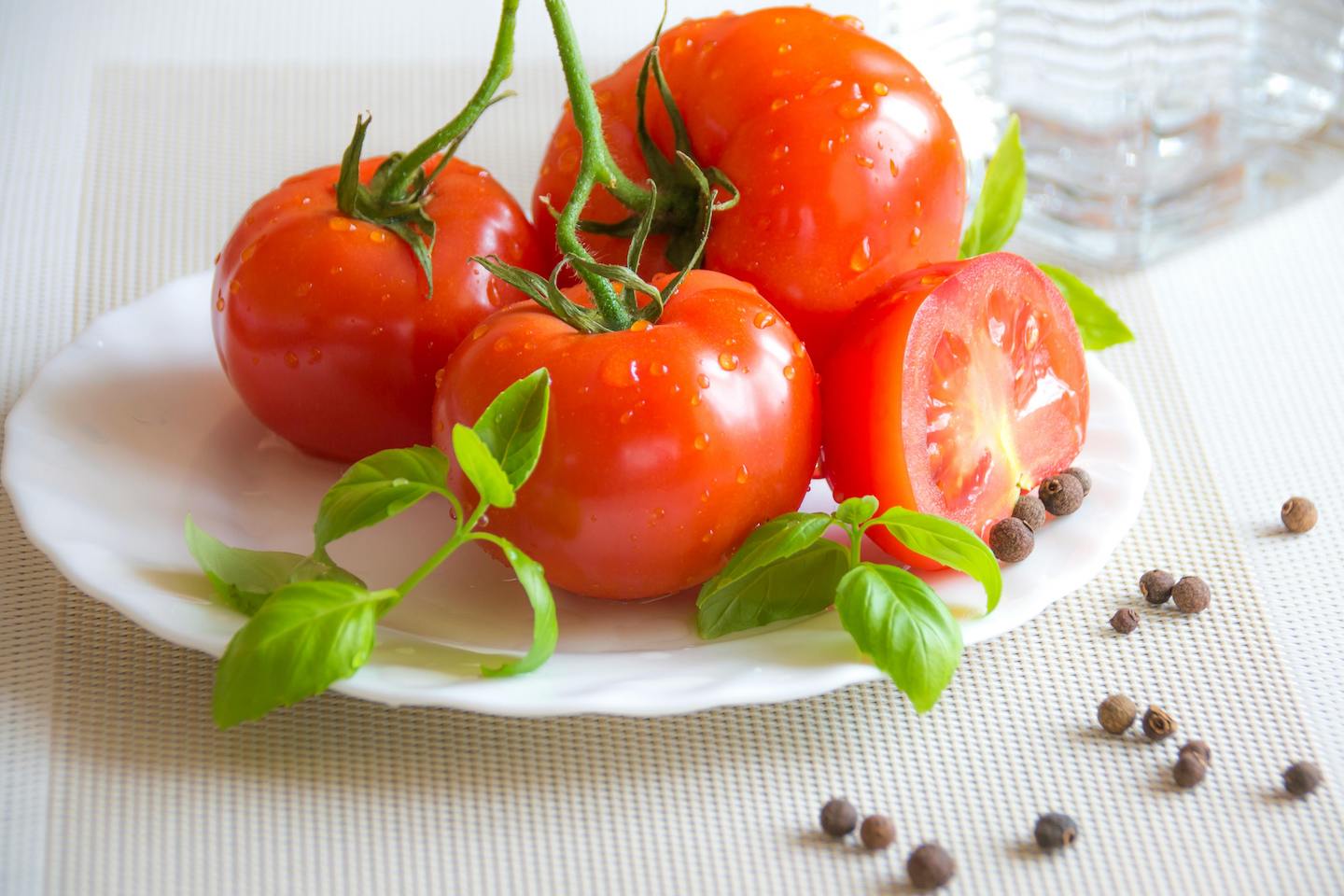Tomatoes, A Nutrient-Packed Superfood for Health and Flavor
 Fruit or vegetable? The debate over whether the tomato is a fruit, or vegetable has been around for centuries. Fun fact: in 1893, the U.S. Supreme Court legally classified tomatoes as vegetables! However, from a botanical perspective, tomatoes are considered fruits due to their seeds.
Fruit or vegetable? The debate over whether the tomato is a fruit, or vegetable has been around for centuries. Fun fact: in 1893, the U.S. Supreme Court legally classified tomatoes as vegetables! However, from a botanical perspective, tomatoes are considered fruits due to their seeds.
Regardless of what you call them, tomatoes are packed with health benefits. They are a versatile food rich in vitamins and minerals with powerful protective properties!
Not only are they great for you, but tomatoes can also be used in many different dishes. A classic choice is turning them into a delicious pasta sauce. Coincidentally, October is National Pasta Month, so it’s the perfect time to enjoy a bowl of your favorite pasta with tomato sauce!
Health Benefits of Tomatoes
Tomatoes are widely considered a superfood, brimming with nutrients that offer many health benefits. Here, we’ll highlight five key benefits of tomatoes, along with some delicious, nutrient-packed recipes.
- Chock Full of Vitamins
First and foremost, tomatoes contain a significant amount of vitamins A, C, K, and folate. In fact, one medium tomato provides about 40% of the recommended daily vitamin C requirement. This powerful vitamin aids the body in its antioxidant efforts by preventing free radicals from causing damage to the body. Vitamin A is also a powerful antioxidant that specifically supports vision quality and prevents possible damage to the eyes due to free radicals. Vitamin K plays a major role in blood clotting, and folic acid plays an important role in cell growth and regeneration making it especially beneficial for pregnant women.
- Overflowing with Minerals
Tomatoes are rich in essential minerals like potassium, manganese, magnesium, phosphorus, iron, and copper. These minerals play critical roles in supporting heart health, maintaining bone strength, boosting immunity, and promoting proper muscle and nerve function. Including tomatoes in your diet can help ensure your body gets these vital nutrients for overall wellness.
- Reduces risk of Heart Disease
Consuming tomatoes can help reduce your risk of heart disease. One study found that women who consumed 7-10 tomato products per week had a 29 percent reduction in their risk of developing heart disease as opposed to women who ate less than a serving of tomatoes per week. Researchers are still working to identify several phytonutrients contained in tomatoes that benefit heart health, but so far it has been proven that tomatoes help to lower total cholesterol, LDL levels and triglycerides. This is one reason why increased tomato intake has been shown to reduce the risk of developing heart disease.
- Aids in Digestive, Skin, Teeth and Bone Health
Tomatoes are rich in dietary fiber. The large amount of fiber in tomatoes accounts for their beneficial quality of aiding in digestive health as well as reducing and/or preventing symptoms of diarrhea and constipation. Tomatoes have also been known to improve skin, teeth, and bone health. Interestingly, it has been shown that one of the natural ways to cure sunburn is through topical application of tomato juice to the affected area.
- Pumped up with Powerful Lycopene
In more recent years, tomatoes garnered the reputation for containing lycopene, the potent antioxidant that gives them their distinct red hue. Similar to other antioxidants, lycopene hinders the activities of the destructive substances that form from the stressors of the body called free radicals. Lycopene binds to these free radicals preventing them from causing cell damage that could result in diseases including cancer and cardiovascular diseases. Many people are not aware that to obtain all the valuable effects of lycopene, it is best to consume tomatoes after they are cooked. Heat breaks down cell walls, helping to release the lycopene and enhance absorption in the body.
Perfect Your Pasta
There are a ton of options when it comes to cooking pasta. What makes pasta so great is that it is a great vehicle for other foods! Making your ultimate pasta dish should be fun and delicious. Check out some of these tips to perfect your next bowl of pasta:
- Choose your Pasta- Now that you know all the various pasta options, you may be wondering what to choose. While enriched white flour pasta is always an option, whole grains will provide even more nutrients to your pasta dish. Opt for a pasta higher in whole grain such as brown rice or lentil pasta which will provide more flavor and more pizazz.
- All About the Sauce- Making pasta sauce at home can be a fantastic idea, however, when you are trying to save on time, a canned sauce is the next best option. When choosing a pasta sauce, always read the label and look for options without any added sugars or none at all. Try to also choose those lower in saturated fats and sodium.
- Pick Your Protein- Pasta makes a great base for other ingredients. Not all pasta dishes need protein, but it can be a great addition to make your dish more delicious and keep you feeling fuller longer. Choose a lean protein option such as chicken or fish. In addition, plant-based protein options are also a great idea, try out edamame or chickpeas.
- Don’t forget the Toppings- What is a classic pasta dish without some cheese? A popular go-to pasta topping is often some Parmesan cheese. Parmesan cheese can be a great topping to your pasta dish; however, it may be time to get creative! Try topping your next pasta dish with sliced almonds, or walnuts, or even pumpkin seeds. These toppings will add some crunch and some healthy fats to your dish.
With pasta being so versatile, it’s no wonder why it’s one of America’s favorite foods. Don’t forget to get creative and utilize all your pasta options to make a healthy and delicious pasta dish!


Leave a Reply
Want to join the discussion?Feel free to contribute!